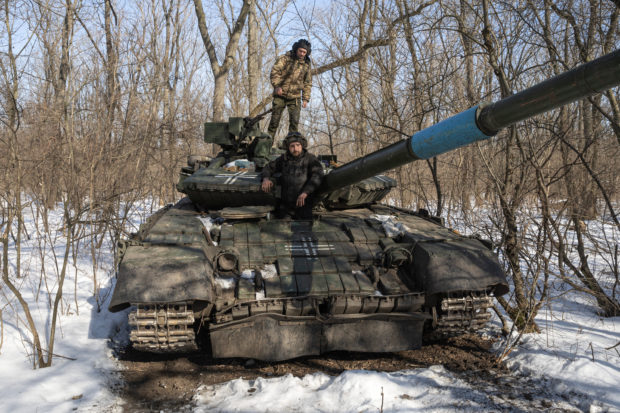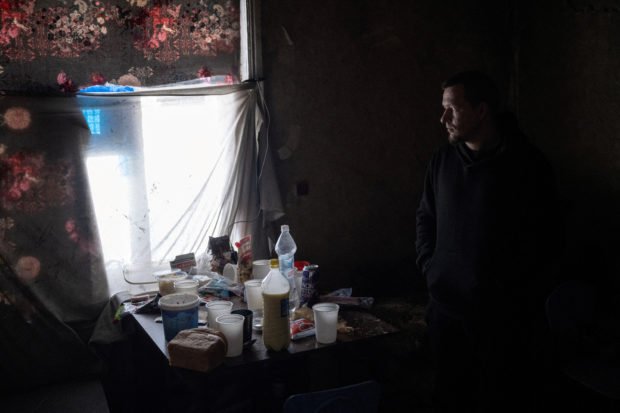War in Ukraine drags into second year, Russia isolated in UN vote

Ukrainian servicemen of the 17th Independent Tanks Brigade are seen atop of a T-64 tank, as Russia’s attack on Ukraine continues, near the frontline town of Bakhmut, Donetsk region, Ukraine February 23, 2023. REUTERS
KYIV — The war in Ukraine entered its second year with no end in sight and Russia isolated at the United Nations in a vote demanding its forces withdraw, while G7 leaders are set to coordinate more support for Ukraine on Friday.
As fighting raged on in Ukraine’s east and south, Kyiv’s allies around the world showed their support on the first anniversary of Russia’s invasion on Feb. 24.
Paris lit up the Eiffel Tower in the Ukrainian flag colors of blue and yellow and people draped in Ukrainian flags gathered at a vigil in London. In Brussels, European Union buildings were similarly lit up in those colors.
The United Nations General Assembly overwhelmingly adopted a resolution on Thursday marking the war’s anniversary and demanding Moscow pull out and stop fighting.
There were 141 votes in favor and 32 abstentions. Six countries joined Russia to vote no – Belarus, North Korea, Eritrea, Mali, Nicaragua and Syria. Russia’s close ally China abstained on the U.N. vote.
Article continues after this advertisementRussia’s Deputy U.N. Ambassador Dmitry Polyanskiy dismissed the action at the United Nations as “useless”.
Article continues after this advertisementUkrainian President Volodymyr Zelensky posted on Twitter: “This resolution is a powerful signal of unflagging global support for Ukraine”.
On the battlefield, the Ukraine military reported increased Russian activity in the east and south as the anniversary approached, with at least 25 towns and villages in three northern regions along the Russian border under fire.
Reuters was not able to verify battlefield reports.
Russian President Vladimir Putin had ordered a full-scale invasion of Ukraine last year to seize Kyiv quickly and topple the pro-European government, but those hopes were dashed by a fierce defence and military blunders that embarrassed Moscow.
Ukraine had success with counter-offensives in late 2022 to grab back much of the territory it lost early on. Russia now controls around a fifth of Ukraine.

Oleg, a Ukrainian servicemen of the 17th Independent Tanks Brigade, prepares tea, as Russia’s attack on Ukraine continues, near the frontline town of Bakhmut, Donetsk region, Ukraine February 23, 2023. REUTERS
Trench warfare
The war, which Moscow calls a “special military operation” to protect Russian sovereignty, has settled into attritional trench warfare, with rising losses on both sides, particularly this year in fighting in and around the eastern town of Bakhmut.
Some U.S. and Western officials estimate Russia’s casualties at nearly 200,000 dead or wounded, while in November the top U.S. general said more than 100,000 troops on each side had been killed or wounded.
It is impossible to independently verify casualties in what has become the worst conflict in Europe since World War Two.
Millions of Ukrainians have fled their country and tens of thousands of civilians have been killed.
The village of Bucha in the north near Kyiv, where mass graves were discovered, and the bombed out southern city of Mariupol became symbols of what Ukraine and its allies described as Russian brutality.
Kyiv and the West have accused Russia of war crimes, but Moscow denies targeting civilians.
Far from the military campaigns on the frontlines of Ukraine, the war has damaged the world economy and a Cold War chill has set into international relations, with Putin raising the spectre of nuclear weapons.
With Putin signalling a desire to double down on a conflict that prompted tough Western sanctions against Russia, and Zelenskiy insisting on his country’s sovereignty and Moscow’s withdrawal, the prospects of peace appear bleak.
“We don’t know when the war will end. But what we do know isthat when the war ends, we need to ensure that history doesn’t repeat itself,” Nato Secretary-General Jens Stoltenberg told Reuters on Thursday.
“We need to ensure that we break the cycle of Russianaggression. We need to prevent Russia from chipping away atEuropean security,” he said.

Support for Ukraine
U.S. President Joe Biden will meet virtually on Friday with G7 leaders and Zelenskiy to mark the anniversary and announce new sanctions against those aiding Russia’s war effort, the White House said.
“We must do everything to make sure they produce results for Ukraine, ones that are truly significant and not just symbolic, given that it is Feb. 24, but also in terms of real value for our defense,” Zelenskiy said in his nightly video address.
Washington has said China is considering providing weapons for Russia’s war in Ukraine, a move that could intensify the conflict into a confrontation between Russia and China on one side and Ukraine and the U.S.-led Nato military alliance on the other.
Beijing’s top diplomat visited Moscow this week and pledged a deeper relationship between the countries and Putin on Thursday hailed “new frontiers” in ties with Beijing and signaled China’s leader Xi Jinping would visit.
Xi is expected to deliver a “peace speech” on Friday, though some analysts have cast doubt on whether Beijing’s efforts to act as peacemaker will go beyond rhetoric.
Reflecting the Kremlin’s increasingly hawkish narrative, Russian Defense Minister Sergei Shoigu on Thursday cast it as an existential fight against a hostile West.
Ukraine and its allies say the invasion is an unjustified land grab aimed at subjugating a sovereign state.
Further ratcheting up tensions, Putin announced plans on Thursday to deploy new Sarmat multi-warhead intercontinental ballistic missiles this year. Earlier this week, he suspended Russia’s participation with the United States in the New START, or Strategic Arms Reduction Treaty, on nuclear arms control.
Russia’s military focus after a year of fighting is now on seizing the eastern Ukrainian regions of Donetsk and Luhansk, which together form the strategic industrial area known as the Donbas near the Russian border.
Close to a Ukrainian tank park near Bakhmut, which has become Russia’s main target, constant explosions could be heard echoing in the distance on Thursday.
“If we give up Bakhmut, everything else will get even more complicated. We can’t give it up, under any circumstance. We will hold through,” Junior Sergeant Oleh Slavin, a tank operator, told Reuters.